| 10 June |
• yesterday • tomorrow |
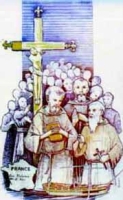
• Martyrs des Pontons de Rochefort
• Martyrs of La Rochelle
• Martyrs of Rochefort
• Martyrs of the Prison Hulks of Rochefort
• Martyrs of the Rochefort Ships
In 1790 the French Revolutionary authorities passed a law requiring priests to swear allegience to the civil constitution, which would effectively remove them from the authority of, and allegience to, Rome. Many refused, and in 1791 the government began deporting them to French Guyana. 827 priests and religious were imprisoned on hulks (old ships no longer sea-worthy and used for storage, jails, hospitals, etc.) at Rochefort, France to await exile, most on the Deux-Associés and the Washington which had previously been used to house slaves or prisoners. There they were basically ignored to death as there was little provision for food and water, less for sanitation, and none at all for medical help. 542 of the prisoners died there.
The survivors were freed on 12 February 1795 and allowed to return to their homes. Many of them wrote about their time on the hulks, and many of them wrote about the faith and ministry of those who had died. 64 of them have been positively identified and confirmed to have died as martyrs, dying for their faith –
• Antoine Auriel
• Antoine Bannassat
• Augustin-Joseph Desgardin
• Barthélemy Jarrige de La Morelie de Biars
• Charles-Antoine-Nicolas Ancel
• Charles-Arnould Hanus
• Charles-René Collas du Bignon
• Claude Beguignot
• Claude Dumonet
• Claude Laplace
• Claude Richard
• Claude-Barnabé Laurent de Mascloux
• Claude-Joseph Jouffret de Bonnefont
• élie Leymarie de Laroche
• Florent Dumontet de Cardaillac
• François d'Oudinot de la Boissière
• François François
• François Hunot
• François Mayaudon
• Gabriel Pergaud
• Georges-Edme René
• Gervais-Protais Brunel
• Jacques Gagnot
• Jacques Lombardie
• Jacques Retouret
• Jacques-Morelle Dupas
• Jean Baptiste Guillaume
• Jean Bourdon
• Jean Hunot
• Jean Mopinot
• Jean-Baptiste de Bruxelles
• Jean-Baptiste Duverneuil
• Jean-Baptiste Laborie du Vivier
• Jean-Baptiste Menestrel
• Jean-Baptiste Souzy
• Jean-Baptiste-Ignace-Pierre Vernoy de Montjournal
• Jean-Baptiste-Xavier Loir
• Jean-François Jarrige de la Morelie de Breuil
• Jean-Georges Rehm
• Jean-Nicolas Cordier
• Joseph Imbert
• Joseph Juge de Saint-Martin
• Joseph Marchandon
• Lazare Tiersot
• Louis-Armand-Joseph Adam
• Louis-François Lebrun
• Louis-Wulphy Huppy
• Marcel-Gaucher Labiche de Reignefort
• Michel-Bernard Marchand
• Michel-Louis Brulard
• Nicolas Savouret
• Nicolas Tabouillot
• Noël-Hilaire Le Conte
• Paul-Jean Charles
• Philippe Papon
• Pierre Gabilhaud
• Pierre Jarrige de la Morelie de Puyredon
• Pierre-Joseph le Groing de la Romagère
• Pierre-Michel Noël
• Pierre-Sulpice-Christophe Faverge
• Pierre-Yrieix Labrouhe de Laborderie
• Raymond Petiniaud de Jourgnac
• Scipion-Jérôme Brigeat Lambert
• Sébastien-Loup Hunot
between 19 May 1794 and 23 February 1795 aboard prison ships docked at Rochefort, Charente-Maritime, France
1 October 1995 by Pope John Paul II
https://catholicsaints.info/martyrs-of-the-hulks-of-rochefort/
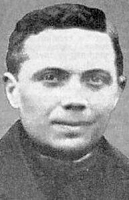
Son of Dèsirè, a baker, and Josefa; Edward was one of eleven children; one brother became a priest, five sisters were nuns. Raised in a pious and hard working family, Edward was an energetic, almost hyperactive child, but an excellent student who early felt a call to the priesthood. His father died in January 1907, and Edward wanted to take over the family business, but his mother insisted that he continue his studies. Seminarians were subject to military service, and in September 1910 Edward was drafted; being a seminarian made him the target for much harassment. He entered the seminary in Leuven, Belgium on 13 March 1912, and in Ghent in September 1913. He served as battlefield nurse during World War I, during which his health was nearly ruined, and his prayers to Saint Joseph led to the miraculous freeing of several prisoners of war.
Ordained on 1 May 1916. Associate pastor at Saint Collette's in Ghent, a struggling parish where he had strong ministry to the poor, children and the dying; taught catechism, founded Eucharistic associations, and worked against the secularization of life in his city. His health still suffering, he was transferred to rural Moerzeke, Belgium where he served from 1918 to 1922 as rector of a religious community. He suffered a heart attack on 11 May 1919, and spent his recuperation studying, praying, and writing hundreds of articles and thousands of letters against Marxism, secularism, and materialism. Edward developed a devotion to Saint Therese of Lisieux, visiting her tomb in 1920, and adopting her "little way". He organized teachers in an evangelization campaign, and his home became a center of organization, prayer and spiritual rebirth. Began service as spiritual director of seminarians doing military service in October 1922. He suffered another heart attack on 1 January 1924, and his health deteriorated rapidly, but he worked tirelessly in his remaining months, encouraging the laity and seminarians.
18 December 1890 in Temse, Belgium
10 June 1924 at Moerzeke, Belgium of a stroke
3 October 1999 by Pope John Paul II
Have you ever noticed the halo of light that surrounds holy priests and illuminates all those in their presence? They bring about such transformations by the silent preaching of their holy life! How many imitators they draw in their wake, attracting them by their priestly ideal! May Jesus favor us with entering into contact with such a priest! - Blessed Edward Poppe
According to the divine plan, action must be fed with prayer. The interior life is the wellspring of the apostolate. Do not believe in the slogan, 'The priest is sanctified in sanctifying others' - it's an illusion. The real formula is, 'Sanctify yourself so as to sanctify others.' - Blessed Edward Poppe
Remember Your sufferings, Jesus. Remember Your love, and the innocence of the little ones! Send us Your priests! - Blessed Edward Poppe
https://catholicsaints.info/blessed-edward-joannes-maria-poppe/
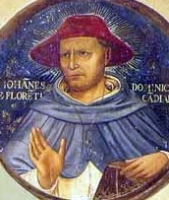
• Giovanni Dominici
• John Dominici
• John Dominici de Banchini
He had a humble background, little education, and a tendency to stammer and stutter, but John had a great memory, great drive to improve, and became a great theologian and preacher. He spent much of his youth in or around the nearby Dominican church of Santa Maria Novella. Though he lacked education and the Dominicans were scholars, and though he had trouble speaking and the Dominicans were preachers, he joined the Order at age 17.
He studied in Pisa and Florence in Italy, and received his degree in theology from the University of Paris. Priest. In one letters, he said that his speech impediment threatened to limit his vocation; it was cured through the intervention of Saint Catherine of Siena, and he spent 12 years as a preacher in Venice, Italy.
Prior of the Dominican house at Santa Maria Novella. Vicar-provincial in Rome, Italy in 1392. With Blessed Raymund of Capua, master general of the Order, he helped lead the rebuilding of the Order after the plague, and restoration of discipline to the members. Founded Dominican houses and convents in the Italian cities of Venice (1388 and 1394), Fiesole (1406), Chioggia, Citta di Castello, Cortona, Lucca, and Fabriano. Correspondent with Blessed Clara Gambacorta, giving her advice on her work to restore discipline to Dominican nuns. Because of his support of the Dominican White Penitents in Venice, he briefly lost papal support, but was later welcomed back, and resumed the work.
Worked to support Christian education of the young. Opposed pagan ideas that were creeping into the humanist thought of the day. Confessor and advisor to Pope Gregory XII. Cardinal of San Sisto in 1407. Archbishop of Ragusa, Italy in 1408. Helped heal the Western Schism. Convinced Pope Gregory XII to call the Council of Constance, and to abdicate in order to force the hands of the anti-popes, causing them to drop their claims to the crown.
Papal legate to Hungary and Bohemia for Pope Martin V. Worked to settle the disruptions caused by the death of John Hus, and to heal the Hussite Schism; converted some, but was unable to affect the larger problem.
Wrote Scripture commentaries and hymns in Italian. His portrait was painted by Fra Angelico, who had joined the order under him, and a memoir of him was written by Saint Antoninus of Florence who had joined the Order after hearing John preach, and had worked with him in Fiesole.
1356 at Florence, Italy
• 10 June 1419 of a fever at Buda, Hungary
• buried in the Church of Saint Paul the Hermit in Buda
• his tomb became noted for miracles, and was briefly a pilgrimage point
• it was destroyed by the Turks
• 1832 (cultus confirmed) by Pope Gregory XVI
• 1837 (beatified) by Pope Gregory XVI
https://catholicsaints.info/blessed-john-dominic/
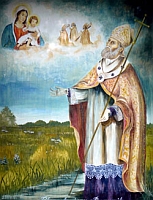
Bogimilus, Bogumil Piotr, Bogumilo, Theophilus
Born to the Polish nobility, twin brother of Boguphalus. Studied in Paris, France. Priest. Served Holy Trinity parish in Dobrow, Poland, a church that he built himself. Chancellor of Gniezno, Poland. Had a great dedication to the Blessed Virgin Mary, and loved solitude. Archbishop of Gniezno in 1167. Through the five years of his episcopacy, he was opposed by his own clergy for his insistence on strict adherance to the clerical discipline and simple lifestyle. He resigned his see in 1172 and became a Camaldolese hermit at Uniedow, Poland for the last decade of his life.
c.1135 bear Dobrow, Poland
• c.1182 near Uniedow, Poland of natural causes
• on his deathbed he received a vision of Our Lady and the Christ Child surrounded by angels and beckoning him to heaven
• relics enshrine in the Collegiate Church of the Assumption of the Blessed Virgin Mary, Uniejów, Poland
• his stole is kept in Archcathedral Basilica of Saint Peter and Saint Paul, Poznan, Poland
27 May 1925 by Pope Pius XI (cultus confirmation)
archdiocese of Gniezno, Poland (given by Pope Paul VI)
• bishop having a vision of the Blessed Virgin Mary
• bishop holding a fish
• bishop walking on the surface of a stream or river
https://catholicsaints.info/blessed-bogumilus-of-gniezno/
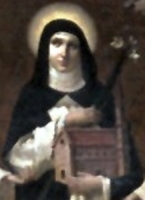
Born to a wealthy and politically connected land owner. We know nothing of her childhood, but was known as a beautiful, intelligent and happy young woman. Influenced by the preaching of Blessed Reginald, she joined the Dominicans, and was received into the Order by Saint Dominic de Guzman himself, but her family forced her to stay home. She joined the Augustinians at Roxana, Italy, but was abducted and taken home by her family; Diana was injured in the abduction, but later escaped from home and returned to the Augustinians. Blessed Jordan of Saxony met with her family and convinced them that the way to keep the girl close to them was to build a Dominican convent; in 1222 they helped her found the monastery of Saint Agnes in Bologna, Italy on land her father owned. She and several other sisters, including Blessed Cecilia of Bologna and Blessed Amata of Bologna lived out their days there. Diana and Blessed Jordan kept up a correspondence that lasted for years and dozens of letters, many of which survive today.
1201 near Bologna, Italy
9 January 1236 in Bologna, Italy of natural causes
8 August 1888 by Pope Leo XIII
Domincan nun holding lilies (indicative of purity) and the Saint Agnes convent
https://catholicsaints.info/blessed-diana-dandalo/
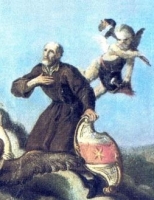
• Henry of Bolzano
• Henry of Bozen
• Arrigo, Heinrich, Rigo
Born poor, Henry was a married lay man and father who worked as a day labourer. However, when his wife and child died young, Henry completely lost interest in a worldly life. He continued to work as a labourer, giving away everything he could spare. He never learned to read or write, but attended daily Mass, worked to help those even poorer than himself, and spent his spare time in prayer. In his later years he became a beggar, asking alms and giving away all that he did not need.
c.1250 at Bolzano, Italy
• 10 June 1315 in Treviso, Italy of natural causes
• he was so well loved by the people of Treviso that at his death his little room was stripped of the straw that served for his bed and was his only possession
• 23 July 1750 by Pope Benedict XIV (cultus confirmed)
• 276 miracles were recorded before the confirmation could be completed
https://catholicsaints.info/blessed-henry-of-treviso/
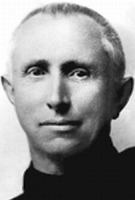
Brother Eustachius
As a young man he was apprenticed as an iron worker, but an injury ended that career. He joined the Order of the Hospitallers of Saint John of God at Reichenbach, Germany in 1893, making his profession in 1898. He served 20 years in several Hospitaller convent hospitals, often as their prior. He then served 21 years as the Hospitaller provincial. Founded two hospitals.
15 January 1867 in Neuhaus, diocese of Regensburg, Bavaria, Germany
10 June 1946 in Regensburg, Bavaria, Germany of natural causes
• 4 October 2009 by Pope Benedict XVI
• recognition celebrated at the Cathedral of Regensburg, Germany by Archbishop Angelo Amato
https://catholicsaints.info/blessed-joseph-kugler/
Getulio
Husband of Saint Symphorosa of Tivoli. Roman officer in the armies of Emperors Trajan and Hadrian. Public convert to Christianity with his brother Saint Amantius. Getulius resigned his commission, and retired to the country of the Sabines. Emperor Hadrian sent the guards Caerealis and Primitivus to arrest the ex-officer; instead, the brothers converted the guards. Hadrian ordered the judge Licinius to condemn the whole group to death. They were offered a reprieve if they would renounce Christianity; they declined. Martyr.
clubbed to death c.120 at Tivoli, Italy
https://catholicsaints.info/saint-getulius-of-tivoli/
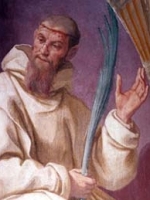
4 May as one of the Carthusian Martyrs
Carthusian lay brother in the London Charterhouse. Arrested with his brothers for opposing the takeover of the Church by King Henry VIII. Chained standing up in Newgate Prison and left to starve. Martyr.
starved to death on 10 June 1537 in Newgate Prison, London, England
29 December 1886 by Pope Leo XIII (cultus confirmed)
https://catholicsaints.info/blessed-walter-pierson/
Public convert to Christianity with his brother Saint Getulius. With Getulius he retired to the country of the Sabines. Emperor Hadrian sent the guards Caerealis and Primitivus to arrest the two; instead, the brothers converted the guards. Emperor Hadrian ordered the judge Licinius to condemn the whole group to death. They were offered a reprieve if they would renounce Christianity; they declined. Martyr.
clubbed to death c.120 at Tivoli, Italy
https://catholicsaints.info/saint-amantius-of-tivoli/
Gerlach, Gerlache, Gerlachus, Gerlacus
Premonstratensian monk at Mönchsrot monastery in southern Germany. Spiritual student of Blessed Eberhard of Obermarchtal and Blessed Ulrik of Obermarchtal. Prior of his house, and then its third abbot where he served until struck down by a stroke.
12th century Germany
10 June c.1200 of natural causes
https://catholicsaints.info/blessed-gerlac-of-obermarchtal/
Itamaro, Ythamar
Known in his day for his learning. First Anglo-Saxon to be ordained a bishop, succeeding Saint Paulinus of York to the see of Rochester, England in 644, consecrated by Saint Honorius. Miraculous cures, especially of the eyes, recorded at his tomb.
at Kent, England
• c.656 of natural causes
• buried at Rochester, England
https://catholicsaints.info/saint-ithamar-of-rochester/

Martyr.
• 303
• buried in the catacombs of San Callisto in Rome, Italy
• relics re-discovered in 1830
• relics transferred to Palma Campania, Italy in 1839
• relics enshrined in a glass reliquary in the church of Saint Michael the Archangel in Palma Campania
https://catholicsaints.info/saint-faustina-of-cyzicus/
Asterio
A former heretic who converted from Arianism to orthodox Christianity. Bishop of Petra. Fought heresy and earned the hatred of Arians by writing about their intrigues at the Council of Sardica in 347. Exiled to Africa by Emperor Constantius. Recalled to his diocese by Julian the Apostate. Assisted at the Council of Alexandria in 362.
c.364 of natural causes
https://catholicsaints.info/saint-asterius-of-petra/
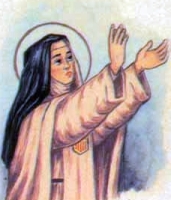
Mercedarian nun in Barcelona, Spain.
• 1300 of a fever at the the monastery of Saint Eulalia, Barcelona, Spain
• interred near the high altar in the monastery church
I want to melt and be in Christ. - Blessed Elizabeth on her deathbed
https://catholicsaints.info/blessed-elizabeth-guillen/
Imperial Roman guard. Sent by Emperor Hadrian with Caerealis to arrest the brother converts Saint Getulius and Saint Amantius. Instead, the brothers converted the guards. Hadrian ordered the judge Licinius to condemn the whole group to death. They were offered a reprieve if they would renounce Christianity; they declined. Martyr.
clubbed to death c.120 at Tivoli, Italy
https://catholicsaints.info/saint-primitivus-of-tivoli/
Imperial Roman guard. Sent by Emperor Hadrian with Primitivus to arrest the brother converts Saint Getulius and Saint Amantius. Instead, the brothers converted the guards. Hadrian ordered the judge Licinius to condemn the whole group to death. They were offered a reprieve if they would renounce Christianity; they declined. Martyr.
clubbed to death c.120 at Tivoli, Italy
https://catholicsaints.info/saint-caerealis-of-tivoli/
Thomas Greenwood
4 May as one of the Carthusian Martyrs
Carthusian choir monk of the Charterhouse in London, England. Martyred for refusing to accept King Henry VIII as head of the Church.
starved to death on 10 June 1537 in Newgate Prison, London, England
29 December 1886 by Pope Leo XIII
https://catholicsaints.info/blessed-thomas-green/
Priest. Member of the Diocesan Laborer Priests of the Sacred Heart of Jesus. Martyred in the Spanish Civil War.
6 November 1892 in Almazora, Castellón, Spain
10 June 1938 in Vall d'Alba, Castellón, Spain
13 October 2013 by Pope Francis
https://catholicsaints.info/blessed-jose-manuel-claramonte-agut/
Ebremund of Fontenay
Married. Founded several monasteries and convents. His wife then entered one of the convents as a nun, and Evermund became a monk at the Fontenay-Louvet house near Séez, France. Abbot.
in Bayeux, France
c.720 of natural causes
https://catholicsaints.info/saint-evermund-of-fontenay/
Amata of Bologna
Dominican nun, assigned to Rome. Helped found the Saint Agnes Convent at Valle di Petro, Bologna, Italy.
• 1270 of natural causes
• interred in the chapel of Saint Clare, Assisi, Italy
https://catholicsaints.info/blessed-amata-of-san-sisto/
Landry
Bishop of Paris, France from 650. Founded the first hospital in Paris. Noted for his work with the poor. Encouraged the Benedictines to establish houses in his diocese.
c.661 of natural causes
https://catholicsaints.info/saint-landericus-of-paris/
Censurio
Bishop of Auxerre, France from 448 until his death; he served 38 years.
• 486 of natural causes
• buried in the church of Saint Germanus
https://catholicsaints.info/saint-censurius-of-auxerre/
Maurino
Monk at the monastery of Saint Panteleon, Cologne, Germany. Probably served as abbot of his house. Martyr.
Cologne, Germany
https://catholicsaints.info/saint-maurinus-of-cologne/
Franciscan friar from the Cotignola area of Ravenna, Italy, remembered in an early Franciscan martyrology for his "wisdom, writing and piety".
c.1531
https://catholicsaints.info/blessed-albert-of-cotignola/
Monk at Novalèse abbey in Savoy (part of modern France). Martyr.
drowned in the River Arc (in modern France) in 1050
https://catholicsaints.info/saint-landericus-of-novalese/
Martyred in the persecutions of Emperor Nero.
martyred in the 1st century, either in Rome, Italy, or in Spain; records are unclear
https://catholicsaints.info/saint-restitutus-of-rome/
Martyred in the persecutions of Emperor Nero.
martyred in the 1st century, either in Rome, Italy, or in Spain; records are unclear
https://catholicsaints.info/saint-crispulus-of-rome/
Nun who served as alms-beggar for her house in Carpi, Italy.
Austria
1546
https://catholicsaints.info/blessed-mary-magdalene-of-carpi/
Bishop of Prusa, Bithynia (in modern Turkey). Martyred in the persecutions of Julian the Apostate.
362
https://catholicsaints.info/saint-timothy-of-prusa/
Illathan, Iolladham
Sixth century bishop of Rathlihen, Offaly, Ireland.
https://catholicsaints.info/saint-illadan-of-rathlihen/
Leader of a group of Franciscan tertiaries in Germany.
1527
https://catholicsaints.info/blessed-elisabeth-hernden/
Martyr.
at Nicomedia, date unknown
https://catholicsaints.info/saint-zachary-of-nicomedia/
A group of seventeen Christians martyred together in North Africa; the only surviving details are two of their names - Aresius and Rogatius.
North Africa, date unknown
https://catholicsaints.info/martyrs-of-north-africa-10-june/
A group of 23 martyrs who died together in the persecutions of Aurelian. The only details that survive are three of their names - Basilides, Mandal and Tripos.
c.270-275 on the Aurelian Way, Rome, Italy
https://catholicsaints.info/martyrs-of-the-aurelian-way/
• Our Lady of the Grotto
• Martyrs of Besech
• Bonaventura Baduario of Peraga
• Guido di Valperga
• Maximus of Naples
• Thiddag of Prague
CatholicSaints.Info Portable Edition